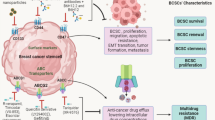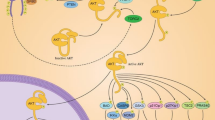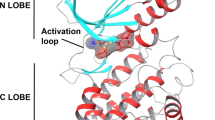Abstract
Our previous studies have proved that CCL18 is the most secreted chemokine in breast cancer microenvironment by tumor associated macrophages (TAMs). CCL18 promotes breast cancer invasiveness by binding to its cognate receptor PITPNM3 and activating the downstream signaling pathways. The high level of CCL18 in serum or tumor stroma is associated with tumor metastasis and poor patients overall survival. In this study, we identify an effective small molecular compound (SMC) to antagonize the effect of CCL18. We screen more than 1000 SMCs from Sun Yat-sen University SMC library and select 15 top scored SMCs by using computer-aided virtual screening based on the structure of CCL18. Then in vitro cell migration assay narrows down the selected 15 SMCs to the most effective SMC-21598. We find 10 µM SMC-21598 significantly inhibits CCL18-induced breast cancer cells adherence, invasiveness, and migration. Our further surface plasmon resonance (SPR), fluorescence spectroscopy and isothermal titration calorimetry (ITC) assays reveal that SMC-21598 binds tightly to CCL18, which blocks the binding of CCL18 with its receptor PITPNM3. The in vivo animal experiments show that SMC-21598 doesn’t significantly affect xenografts growth, but inhibits lung metastasis. Our study provides a potential lead compound to antagonize CCL18 function. It would be of great significance to develop SMC drugs to ameliorate breast cancer metastasis and prolong patients’ survival.






Similar content being viewed by others
References
Su S, Chen J, Yao H, Liu J, Yu S, Lao L et al (2018) CD10(+)GPR77(+) cancer-associated fibroblasts promote cancer formation and chemoresistance by sustaining cancer stemness. Cell 172(841–856):e816
Su S, Wu W, He C, Liu Q, Song E (2014) Breaking the vicious cycle between breast cancer cells and tumor-associated macrophages. Oncoimmunology 3:e953418
Allavena P, Sica A, Solinas G, Porta C, Mantovani A (2008) The inflammatory micro-environment in tumor progression: the role of tumor-associated macrophages. Crit Rev Oncol/Hematol 66:1–9
Condeelis J, Pollard JW (2006) Macrophages: obligate partners for tumor cell migration, invasion, and metastasis. Cell 124:263–266
Chen J, Yao Y, Gong C, Yu F, Su S, Chen J et al (2011) CCL18 from tumor-associated macrophages promotes breast cancer metastasis via PITPNM3. Cancer Cell 19:541–555
Su S, Liu Q, Chen J, Chen J, Chen F, He C et al (2014) A positive feedback loop between mesenchymal-like cancer cells and macrophages is essential to breast cancer metastasis. Cancer Cell 25:605–620
Mantovani A, Sica A (2010) Macrophages, innate immunity and cancer: balance, tolerance, and diversity. Curr Opin Immunol 22:231–237
Bottazzi B, Polentarutti N, Acero R, Balsari A, Boraschi D, Ghezzi P et al (1983) Regulation of the macrophage content of neoplasms by chemoattractants. Science 220:210–212
Ruffell B, Coussens LM (2015) Macrophages and therapeutic resistance in cancer. Cancer Cell 27:462–472
Solinas G, Germano G, Mantovani A, Allavena P (2009) Tumor-associated macrophages (TAM) as major players of the cancer-related inflammation. J Leukoc Biol 86:1065–1073
Pollard JW (2004) Tumour-educated macrophages promote tumour progression and metastasis. Nat Rev Cancer 4:71–78
Mantovani A, Marchesi F, Porta C, Sica A, Allavena P (2007) Inflammation and cancer: breast cancer as a prototype. Breast 16(Suppl 2):S27–33
Yuan L, Wan J, Huang C, Liang J, Liu M, Yue C et al (2017) Evaluation of serum CCL18 as a potential biomarker for ovarian cancer. Cancer Biomark 21:97–104
Schutyser E, Struyf S, Proost P, Opdenakker G, Laureys G, Verhasselt B et al (2002) Identification of biologically active chemokine isoforms from ascitic fluid and elevated levels of CCL18/pulmonary and activation-regulated chemokine in ovarian carcinoma. J Biol Chem 277:24584–24593
Miyake M, Ross S, Lawton A, Chang M, Dai Y, Mengual L et al (2013) Investigation of CCL18 and A1AT as potential urinary biomarkers for bladder cancer detection. BMC Urol 13:42
Huang D, Song SJ, Wu ZZ, Wu W, Cui XY, Chen JN et al (2017) Epstein-barr virus-induced VEGF and GM-CSF drive nasopharyngeal carcinoma metastasis via recruitment and activation of macrophages. Can Res 77:3591–3604
Chenivesse C, Tsicopoulos A (2018) CCL18—beyond chemotaxis. Cytokine 109:52–56
Gunther C, Zimmermann N, Berndt N, Grosser M, Stein A, Koch A et al (2011) Up-regulation of the chemokine CCL18 by macrophages is a potential immunomodulatory pathway in cutaneous T-cell lymphoma. Am J Pathol 179:1434–1442
Zhang G, Guo S, Cui H, Qi J (2018) Virtual screening of small molecular inhibitors against DprE1. Molecules 23:524
Li Y, Su M, Liu Z, Li J, Liu J, Han L et al (2018) Assessing protein-ligand interaction scoring functions with the CASF-2013 benchmark. Nat Protoc 13:666–680
Xie L, Xie L, Kinnings SL, Bourne PE (2012) Novel computational approaches to polypharmacology as a means to define responses to individual drugs. Annu Rev Pharmacol Toxicol 52:361–379
Liang WG, Ren M, Zhao F, Tang WJ (2015) Structures of human CCL18, CCL3, and CCL4 reveal molecular determinants for quaternary structures and sensitivity to insulin-degrading enzyme. J Mol Biol 427:1345–1358
Struyf S, Schutyser E, Gouwy M, Gijsbers K, Proost P, Benoit Y et al (2003) PARC/CCL18 is a plasma CC chemokine with increased levels in childhood acute lymphoblastic leukemia. Am J Pathol 163:2065–2075
Wlodawer A (2002) Rational approach to AIDS drug design through structural biology. Annu Rev Med 53:595–614
Su S, Liao J, Liu J, Huang D, He C, Chen F et al (2017) Blocking the recruitment of naive CD4(+) T cells reverses immunosuppression in breast cancer. Cell Res 27:461–482
Chenivesse C, Chang Y, Azzaoui I, Ait Yahia S, Morales O, Ple C et al (2012) Pulmonary CCL18 recruits human regulatory T cells. J Immunol 189:128–137
Atamas SP, Luzina IG, Choi J, Tsymbalyuk N, Carbonetti NH, Singh IS et al (2003) Pulmonary and activation-regulated chemokine stimulates collagen production in lung fibroblasts. Am J Respir Cell Mol Biol 29:743–749
Pardo A, Smith KM, Abrams J, Coffman R, Bustos M, McClanahan TK et al (2001) CCL18/DC-CK-1/PARC up-regulation in hypersensitivity pneumonitis. J Leukoc Biol 70:610–616
Broxmeyer HE, Kim CH, Cooper SH, Hangoc G, Hromas R, Pelus LM (1999) Effects of CC, CXC, C, and CX3C chemokines on proliferation of myeloid progenitor cells, and insights into SDF-1-induced chemotaxis of progenitors. Ann NY Acad Sci 872:142–162
Gunther C, Bello-Fernandez C, Kopp T, Kund J, Carballido-Perrig N, Hinteregger S et al (2005) CCL18 is expressed in atopic dermatitis and mediates skin homing of human memory T cells. J Immunol 174:1723–1728
Hector A, Kroner C, Carevic M, Bakele M, Rieber N, Riethmuller J et al (2014) The chemokine CCL18 characterises Pseudomonas infections in cystic fibrosis lung disease. Eur Respir J 44:1608–1615
Godessart N, Kunkel SL (2001) Chemokines in autoimmune disease. Curr Opin Immunol 13:670–675
Ohlstein EH, Ruffolo RR Jr, Elliott JD (2000) Drug discovery in the next millennium. Annu Rev Pharmacol Toxicol 40:177–191
Haraguchi S, Day NK, Kamchaisatian W, Beigier-Pompadre M, Stenger S, Tangsinmankong N et al (2006) LMP-420, a small-molecule inhibitor of TNF-alpha, reduces replication of HIV-1 and Mycobacterium tuberculosis in human cells. AIDS Res Therapy 3:8
Wada Y, Lu R, Zhou D, Chu J, Przewloka T, Zhang S et al (2007) Selective abrogation of Th1 response by STA-5326, a potent IL-12/IL-23 inhibitor. Blood 109:1156–1164
Silvian LF, Friedman JE, Strauch K, Cachero TG, Day ES, Qian F et al (2011) Small molecule inhibition of the TNF family cytokine CD40 ligand through a subunit fracture mechanism. ACS Chem Biol 6:636–647
Acknowledgements
This work was supported by grants from the Natural Science Foundation of China (81672622, 81772828, 81720108029, 81621004, 81490750, 81272900, 81172537), the National Key Research and Development Program of China (2016YFC1302300), Guangdong Science and Technology Department (2016B030229004, 2016A020216028), Guangzhou Science Technology and Innovation Commission (201803040015).
Author information
Authors and Affiliations
Contributions
YL, ES, JC and DL conceived and designed the experiments. YL and HZ equally did the experiment. QL, SL and HL provide animal experiment guide and management. JC and DL are co-PI and supervisor for this research.
Corresponding authors
Ethics declarations
Conflict of interest
The authors declare that they have no conflict of interest.
Additional information
Publisher's Note
Springer Nature remains neutral with regard to jurisdictional claims in published maps and institutional affiliations.
Jingqi Chen—Lead contact.
Rights and permissions
About this article
Cite this article
Liu, Y., Zheng, H., Li, Q. et al. Discovery of CCL18 antagonist blocking breast cancer metastasis. Clin Exp Metastasis 36, 243–255 (2019). https://doi.org/10.1007/s10585-019-09965-2
Received:
Accepted:
Published:
Issue Date:
DOI: https://doi.org/10.1007/s10585-019-09965-2




